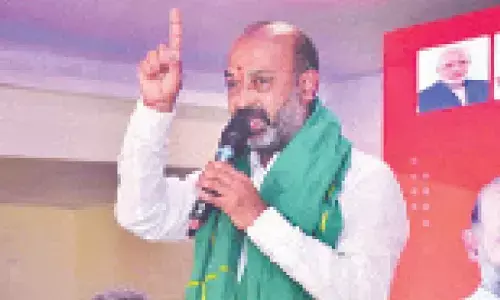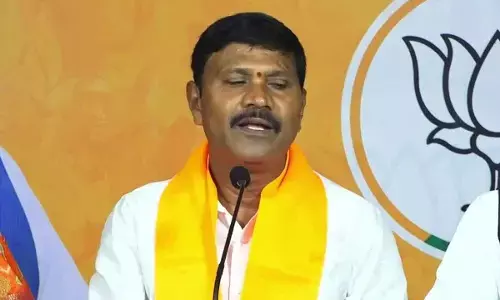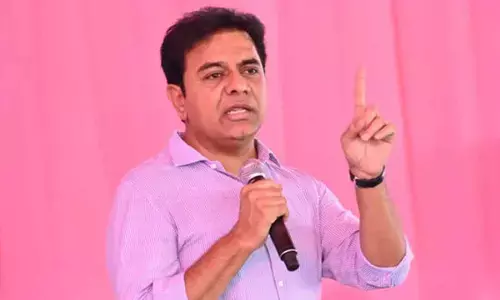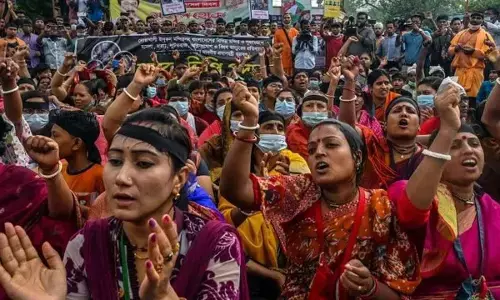Riddance, Mr Minister

Representational Image
Films were made to entertain mainly. Of course, some films catered to religious sentiments and some others to patriotic fervor. A rare few were also made to provide edge-of-the-seat thrills, the horror kind.
Films were made to entertain mainly. Of course, some films catered to religious sentiments and some others to patriotic fervor. A rare few were also made to provide edge-of-the-seat thrills, the horror kind.
Film making was never and is still not a social service. Big money is at stake in every film and, hence, the watchword for the maker is to provide universal appeal. The phrase meant that a film should appeal to all strata of society. In that, the main objective was to cater to not just the family and ladies audience, described as gentry, or, to use another word, the balcony class, but also the masses that thronged the cinema halls from the day a new film released, cheered, clapped and threw coins at the screen if they enjoyed a certain song or dialogue. This lot made the film a success or a failure.
While the masses filled the cinema halls on regular basis, with some even watching a film more than once, the gentry or the family audience usually took in a film during a night show or over the weekend. Masses mattered the most for they were compulsive film watchers. Those were the lovely days of the single screen film exhibition trade. As it were, India lacked adequate number of screens for such a large country and considering the number of films we made. The Hindi film industry alone made over 150 films a year. Most films in those days ran for 25 weeks, adding to the shortage of cinema screens.
The magic of a dark cinema hall with only the illuminated screen was such it was called the silver screen. Only the screen mattered once the projection began. These single screens were built and owned by local individuals borne, in most cases, out of love for cinema, investment or the wish to feel important. For, in those days, dignitaries from a collector to a police commissioner would call to reserve tickets.
To think that all the policies that the rulers from the Centre and the states ever made were unreasonable, making it tough for the cinema exhibition trade to survive.
The exhibition trade took it all in its stride, be it more than 100 per cent entertainment tax imposed by various states, almost two dozen licenses to be renewed every year and so on. None of these was possible without greasing palms. The final blow to the very survival of the single screen was the advent of the multiplexes, welcomed with subsidies, entertainment tax holidays and such gifts laid out on the red carpet. There was no consideration for single screens and their survival. How would they survive such an onslaught? There was no level playing field.
The affordable cinema entertainment, where the crowds thronged, had been done to death. That was an era when for a favorite star's film, like Amitabh Bachchan, cinemas in the hinterlands of Central India and some other parts, opened screening at 6 am in the morning. Cinema managements would report: There are more people outside than there are in the cinema hall, they would wait to take in the next show. No multiplex ever recorded such a phenomenon.
As the multiplex spread its tentacles in the country, it was at the cost of single screens going out of business. For a layman, watching a cinema at a multiplex was akin to entering an airport to take a flight! With the kind of snob values that the multiplexes created, for the masses -- as they were called -- the admission rates often meant a day's earnings.
The multiplex culture turned a one-crore box-office into a multi-crore one. The corporate houses entered the business lured by the multi-crore tag.
That dream ended soon enough. Multi-crore business was not possible without mass participation. The corporate houses gave up, closed shop and now there were no more multi-crore budget films. A big blow to the multiplex chains.
To add to that, now the government has decided to finish the job. With the policy decisions it makes from day to day, it will now put an end to multiplex business, too, the way it killed the single screen cinema. Cinema is a state subject, alright. The entertainment tax on cinema tickets went to the respective states. But now that GST is shared equally by the state and the Centre, shouldn't the Centre have a policy that while OTT platforms make the very survival of cinemas impossible, something needs to be done to save them?For one, cinemas are out of business for 15 months due to the Corona pandemic-enforced lockdown! Meanwhile, OTT platforms are making rapid inroads and successfully filling the void. You don't need to pay high admission rates, or even visit a screen to watch a film. The newest film is now delivered in the comfort of your home for a whole year at the cost of just about two cinema tickets!
In such an event, was it right for the (now former) Information & Broadcasting Minister Prakash Javadekar to force new censor norms on the exhibition trade, norms which mean nothing! Especially when there have been no demands from public, nor any complaints about the way cinemas were working! Looking at the phase the film industry and mainly the cinema trade is going through, one would expect the Government to offer some relief, may be withdraw GST, or at least make the amount symbolic. Give the film trade time to regain all the lost ground before reconsidering. Actually, all the complaints are about the content on OTT platforms and, on that I&B Ministry has been cooling its feet, doing nothing.
The reaction to Javadekar's flight of fancy has raised a lot of criticism from the film fraternity as well as the media. It lacks in logic as well as purpose. Can't think of anything good the minister did for the film industry during his tenure.
A few days after Javadekar made this announcement, he has been sacked from the ministry but he sure did his bit to add one more nail to the coffin of the cinema business, especially the exhibition trade. Just like most other ministers before him.
(Vinod Mirani is a veteran film writer and box office analyst. The views expressed are personal)

















